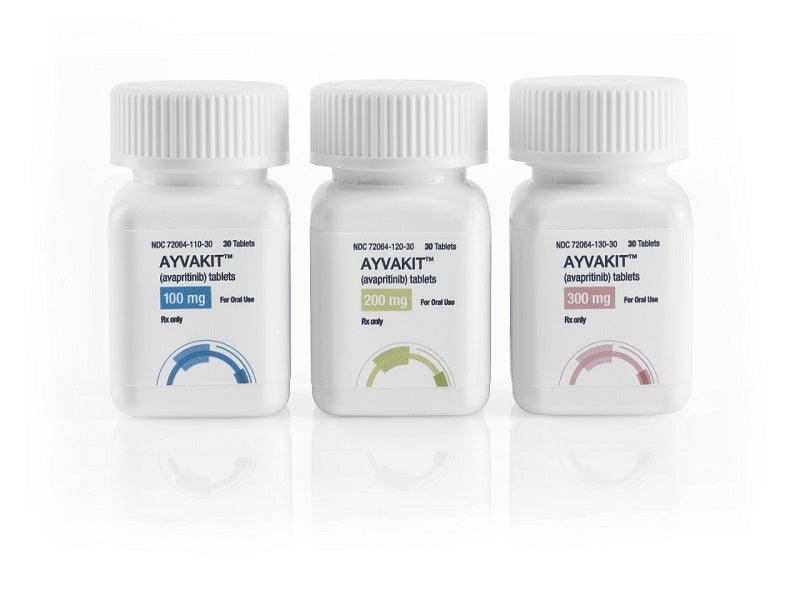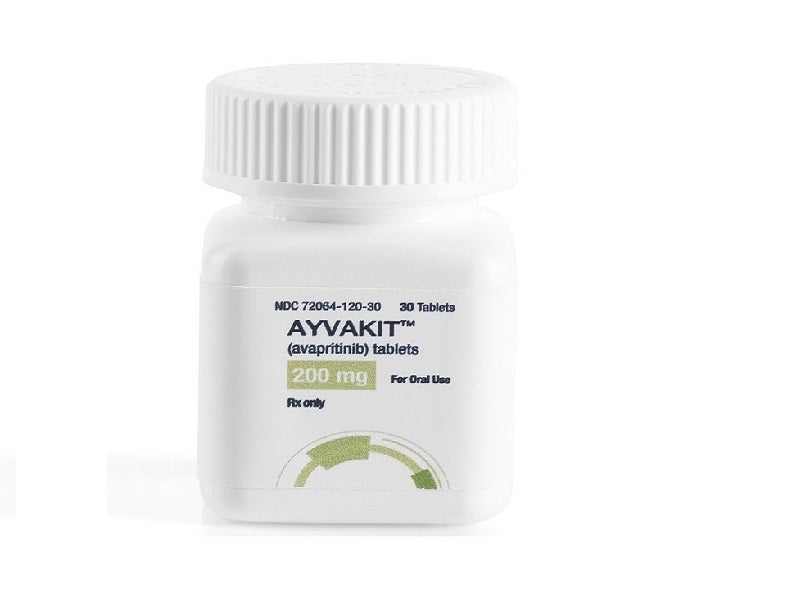AYVAKIT™ (avapritinib) is the first precision therapy approved for the treatment of adults with unresectable or metastatic gastrointestinal stromal tumours (GISTs) and advanced systemic mastocytosis (ASM).
Developed by Blueprint Medicines, AYVAKIT is used to treat the genomically defined population of patients with GIST bearing a platelet-derived growth factor receptor alpha (PDGFRA) exon 18 mutation, including PDGFRA D842V mutations.
Blueprint Medicines selected PANTHERx® Rare Pharmacy as a limited distribution partner for selling AYVAKIT (avapritinib).
Avapritinib’s suggested dose is 300mg once daily (QD). The drug is available in 100mg, 200mg and 300mg strengths as white film-coated capsule-shaped or round tablets.
AYVAKIT approvals
In January 2020, the US Food and Drug Administration (FDA) approved AYVAKIT for gastrointestinal stromal tumours (GISTs) harbouring PDGFRA exon 18 mutations, including D842V mutations.
A new drug application (NDA) for avapritinib was split by the FDA into two NDAs, one for PDGFRA exon 18 mutant GISTs and another for fourth-line GISTs. Blueprint Medicines’s NDA for the treatment of fourth-line GISTs was not approved by the FDA.
In July 2020, the drug received a positive opinion from the European Medicines Agency’s (EMA) Committee for Medicinal Products for Human Use (CHMP) for the treatment of GISTs harbouring the PDGFRA D842V mutation.
In September 2020, Blueprint Medicines received regulatory approval for avapritinib in Europe for the treatment of PDGFRA D842V Mutant GIST.
In December 2020, a supplemental NDA was submitted to the FDA for AYVAKIT for the treatment of ASM. This was approved in June 2021.
Gastrointestinal stromal tumour (GIST) and ASM causes and symptoms
Gastrointestinal stromal tumour or sarcoma (GIST) occurs in the walls of the gastrointestinal tract and ensues in the stomach and small intestine.
Cells in the gastrointestinal tract are known as the interstitial cells of Cajal (ICCs) or precursors to these cells. A tumour can be cancerous (malignant) or non-cancerous (benign).
Symptoms include swelling or pain in the abdomen, loss of appetite, nausea and loss of weight, weakness, tiredness, bleeding of the intestinal tract, throat or stomach, and vomiting of blood.
GIST is usually associated with a mutation in the KIT and PDGFRA gene that provides the instruction for making receptor proteins.
Systemic mastocytosis is a rare haematological disorder caused by the KIT D816V mutation. ASM is a life-threatening complication characterised by excessive damage in several organ systems due to mast cell infiltration.
Avapritinib mechanism of action
AYVAKIT is an inhibitor of tyrosine kinase that targets PDGFRA and PDGFRA D842 mutants, as well as multiple KIT exon 11, 11/17 and 17 mutants.
The drug is the only FDA-approved type 1 GIST inhibitor that prevents KIT and PDGFRA mutations by binding to the ATP-binding site.
AYVAKIT inhibits a broad range of KIT and PDGFRA mutations associated with GIST, including potent clinical activity against activation loop mutations that are associated with resistance to currently approved therapies.
Other targets of avapritinib include wild type KIT, PDGFRB and CSFR1.
Clinical studies on AYVAKIT
The FDA’s approval of avapritinib for GISTs was based on the results of NAVIGATOR, a multi-centre, single-arm, open-label Phase I clinical trial, as well as combined safety results from multiple clinical trials for avapritinib.
The NAVIGATOR clinical study enrolled 43 patients with GISTs nurturing a PDGFRA exon 18 mutation, including 38 patients with PDGFRA D842V mutation.
A total of 204 patients received a starting dose of avapritinib, either 300mg or 400mg once daily (QD), heavily pre-treated with a median of three prior kinase inhibitors. A total of 56% of the patients received exposure for six months or more, while 44% received exposure for more than one year.
Efficacy data for avapritinib were evaluated by blinded, independent central radiology review, based on modified Response Evaluation Criteria in Solid Tumors version 1.1 (mRECIST 1.1 criteria) for GISTs.
The drug indicated durable responses in patients with PDGFRA exon 18 mutations across multiple lines of treatment.
In patients with PDGFRA exon 18 mutations, the overall response rate (ORR) was 84%, including 7% complete responses (CR) and 77% partial responses (PR). In patients harbouring PDGFRA D842V mutations, the ORR was 89% (8% CR, 82% PR).
Neither patient population (range: 1.9 months or more, 20.3 months or longer) reached the median duration of response.
Common adverse reactions observed in patients during the NAVIGATOR study included oedema, asthaenia, pyrexia, abdominal pain, dyspepsia, dizziness, sleep and mood disorders, decreased appetite, increased lacrimation, alopaecia and dyspnoea.
The approval of avapritinib for ASM was based on the outcomes from the Phase I EXPLORER trial and Phase II PATHFINDER trial. The drug achieved its primary endpoint and demonstrated an overall response rate of 57% in 53 evaluable patients with ASM.
The most common adverse events reported in the patients during the trial were oedema, diarrhoea, nausea and fatigue.




